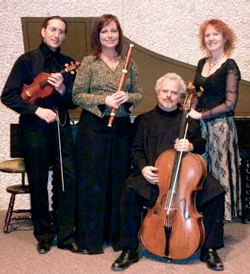by Jane Berkner

Its six movements includes programmatic allusions to Quixote’s attack on windmills, his unrequited love for Princess Dulcinea, and a misadventure involving his enduring servant, Sancho Panza. Director Jeannette Sorrell led the string ensemble from the keyboard, bringing the piece to life with a clear interpretation. The group surged through phrases in complete accord, with a beautiful balance and blend.
Issues of balance are common for Baroque orchestras, with their delicate, period instruments. The second work on the program, J.S. Bach’s Brandenburg Concerto N o. 4, added a solo group of two recorders (Francis Colpron and Kathie Stewart) and violin (Olivier Brault) to the Telemann ensemble. Predictably, the sound of the recorders was frequently lost in the texture of this piece. Apollo’s Fire played the first movement with a bright tempo and a well-accented lilt. The second movement was a bit too muscular, with a heavy approach to the two-note groupings in the tutti sections that got in the way of creating a long, smooth melodic line.
The brilliant technique and seamless playing of solo violinist Olivier Brault was on prominent display throughout the work. He kept it musically interesting with a terrific use of dynamics, and played with an astounding consistency in the running lines that predominate the work. Brault deserves credit for keeping the fourth Brandenburg chugging along with continuous energy, but it was Sorrell who was charged with that task when Apollo’s Fire played the next piece — the fifth concerto.
Sorrell introduced Brandenburg Concerto No. 5 by telling the audience that Bach had recently gotten a new harpsichord at the Cöthen court. It was the composer’s introduction to an instrument with two keyboards, and he was experimenting with its possibilities as he wrote the piece. She said of the harpsichord part, “It starts out in a subservient way, then becomes conversational; then it goes crazy when everyone drops out, and plays alone for an extremely long time.”
Sorrell deftly played the lengthy cadenza in the first movement, embracing the enormous number of notes and shaping them into well-defined phrases. The second movement brought relief to the acoustical problem of hearing the traverso during tutti passages: it is played entirely by the trio of soloists, traverso (Kathie Stewart), violin (Olivier Brault) and harpsichord (Jeannette Sorrell). That trio played as one unit, in perfect agreement, the lines well thought out and grounded in accuracy of pitch. It was as if we had dropped in on an intimate conversation among friends, eloquent and beautifully rendered. Stewart’s traverse flute playing was exquisite — long, silky lines produced with a sound that was a consummate blend of strength and sensitivity.
Handel’s “Chaconne” from Terpsichore (Il pastor fido) followed, with flutes and strings playing in unison with unmatched sweetness. The orchestra included the visually stunning addition of a theorbo, a member of the lute family with a giraffe-like neck.
The final piece, an arrangement by Sorrell of Vivaldi’s La Folia, was one the small orchestra has obviously performed with frequency. They left their music and stands offstage and performed with great gusto, adding improvisatory elements. Smiling and swaying, and playing with theatrical winks and nods, they managed to sustain a warmth and energy in the playing of this arrangement, which could have easily become cloying. When the audience stayed on its feet in hopes of an encore, Apollo’s Fire played an Appalachian fiddle tune, an unusual but lively and joyous ending to an engagingly elegant performance.
Published on ClevelandClassical.com July 7, 2015.
Click here for a printable copy of this article


